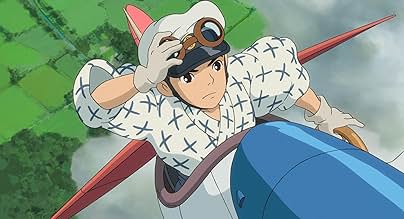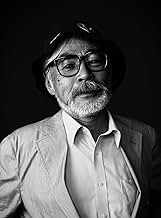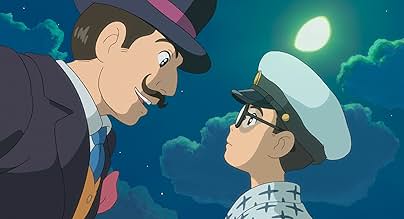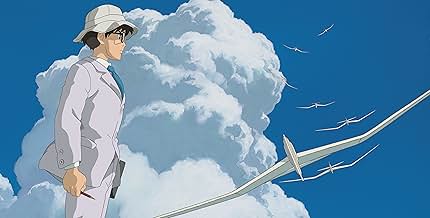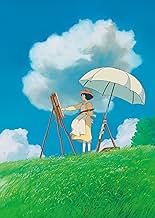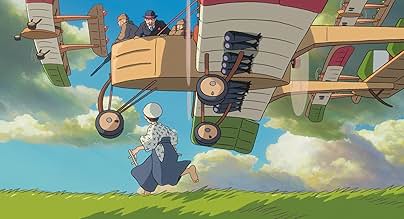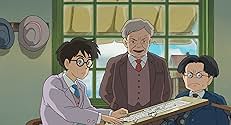Un regard sur la vie de Jiro Horikoshi, l'homme qui a dessiné des avions de chasse japonais pendant la Seconde Guerre mondiale.Un regard sur la vie de Jiro Horikoshi, l'homme qui a dessiné des avions de chasse japonais pendant la Seconde Guerre mondiale.Un regard sur la vie de Jiro Horikoshi, l'homme qui a dessiné des avions de chasse japonais pendant la Seconde Guerre mondiale.
- Réalisation
- Scénario
- Casting principal
- Nommé pour 1 Oscar
- 26 victoires et 54 nominations au total
Hidetoshi Nishijima
- Honjô
- (voix)
Jun Kunimura
- Hattori
- (voix)
Stephen Alpert
- Castorp
- (voix)
- (as Steve Alpert)
Morio Kazama
- Satomi
- (voix)
Joseph Gordon-Levitt
- Jirô Horikoshi
- (English version)
- (voix)
John Krasinski
- Honjô
- (English version)
- (voix)
Emily Blunt
- Nahoko Satomi
- (English version)
- (voix)
Martin Short
- Kurokawa
- (English version)
- (voix)
Stanley Tucci
- Caproni
- (English version)
- (voix)
Mandy Patinkin
- Hattori
- (English version)
- (voix)
Mae Whitman
- Kayo Horikoshi
- (English version)
- (voix)
- …
Avis à la une
This film is totally different from Miyazaki's other films and I personally think, like what he's mentioned, a message to to world about how he looks at the war, war machines , peace, love and living. As I am a Taiwanese, who has once colonized and ruled by Japanese during the second world war, how Japanese coped with the war topic is always sensitive. However, what I saw in this film is truly reflecting that Miyazaki is peace loving and his point of view on war, life and love. He depicted about the beauty of dreams and surviving. You can see that everyone in this film try every hard to live, even though the time is hard and forced to strike a balance between dreams and reality. However, they are self fulfilling. So who is to blame? who ruined their lives and dreams? Those who leads them to the war to blame.
In short, the film perfectly shows how the director's been telling in almost every his masterpiece but in a personally way, to the audience. Just like a final message he would like yo transmit to the world. I felt overwhelmed by the film and sad that he decided to retired. Please go to watch this film and you will do feel the courage to live hard and live well.
In short, the film perfectly shows how the director's been telling in almost every his masterpiece but in a personally way, to the audience. Just like a final message he would like yo transmit to the world. I felt overwhelmed by the film and sad that he decided to retired. Please go to watch this film and you will do feel the courage to live hard and live well.
The Wind Rises is a fictionalized biography / character study of Jiro Hirikoshi and his story of becoming an Aviation Engineer. This movie had a great impact on me after seeing it in the theatre and I thought about what I had seen for the one hour drive home afterwards. In terms of pacing and how the movie focuses on the main character I was reminded of David Lean movies in its maturity and emotional grit. There were also times when watching that I thought to myself I have never seen hand drawn animation this good ever and will probably never see animation this good ever again. The character designs are beautiful. The backgrounds and color pallete are beautiful. The animation is breathtaking. But the story is just as beautiful as the artwork. The movie is about one mans journey to make beautiful airplanes but is also equally tragic in later scenes of the movie in the evolving love story and especially the last scene in the movie.
This movie does not explain at any time through dialogue what the character is feeling but instead it shows you and the subtle and at times powerful emotions which are the glue of what holds his story together. Some people may wonder why Miyazaki took creative risks with the real life story of Jiro Hirikoshi. The real life Jiro never married to a woman with Tuberculosis. Did he really fantasize about building airplanes? Was he really followed by a Soviet Spy? I think the way the character fantasizes about airplanes even when not dreaming is an honest depiction of how creative people like Hayao Miyazaki think.
Along with Porco Rosso this is probably Hayao Miyazaki's most personal movie. If you study Hayao Miyazaki's movies and read about his career like I have it becomes obvious that this movie is as much about Jiro Hirikoshi as it is about Hayao Miyazaki.
I recommend anyone who has ever been creative to go see the Wind Rises.
Hayao Miyazaki's Most Beautiful film.
This movie does not explain at any time through dialogue what the character is feeling but instead it shows you and the subtle and at times powerful emotions which are the glue of what holds his story together. Some people may wonder why Miyazaki took creative risks with the real life story of Jiro Hirikoshi. The real life Jiro never married to a woman with Tuberculosis. Did he really fantasize about building airplanes? Was he really followed by a Soviet Spy? I think the way the character fantasizes about airplanes even when not dreaming is an honest depiction of how creative people like Hayao Miyazaki think.
Along with Porco Rosso this is probably Hayao Miyazaki's most personal movie. If you study Hayao Miyazaki's movies and read about his career like I have it becomes obvious that this movie is as much about Jiro Hirikoshi as it is about Hayao Miyazaki.
I recommend anyone who has ever been creative to go see the Wind Rises.
Hayao Miyazaki's Most Beautiful film.
The film is an interesting melange of Japanese literature, culture and history. It will also disappoint many of Miyazaki's fantasy fans, as this is a biographical movie. In truth, it is based on two different works, one is the diary of the aeronautical engineer who designed the famous Japanese Zero fighter, and the other is a story of two girls in a tuberculosis sanatorium (in truth, Jiro's wife did not have TBC).
Yet the details capture also some of the things closer to Miyazaki's heart: a commentary on the current state of Japan, a hopeful dream for a person who is losing his sight and his passion for flying and for kind independent young women. All in all it might feel a little dry sometimes, but only until you understand that the source material was a diary that has 80% of it containing aeronautical design ideas and calculations.
Perhaps a two hour film about a quiet dreamer of plane designs is not what I would have chosen for Miyazaki's last animation movie, but it wasn't my choice after all. While his artistic expression cannot be stopped - he is still drawing manga and doing other stuff - he publicly announced that this would be his last film, the reason being his worsening eyesight. Considering the first scene of the movie is of a myopic boy who dreams of flying a plane and then crashing because he can't see well, I would say that's a pretty direct statement from the genius animator.
It doesn't matter if I recommend this movie or not. If you are a fan of Ghibli and Miyazaki you will watch it anyway, while if you are not, you can try some other stuff of his, become a die hard fan, and find yourself in a situation already solved previously (that's engineering humor, BTW)
Yet the details capture also some of the things closer to Miyazaki's heart: a commentary on the current state of Japan, a hopeful dream for a person who is losing his sight and his passion for flying and for kind independent young women. All in all it might feel a little dry sometimes, but only until you understand that the source material was a diary that has 80% of it containing aeronautical design ideas and calculations.
Perhaps a two hour film about a quiet dreamer of plane designs is not what I would have chosen for Miyazaki's last animation movie, but it wasn't my choice after all. While his artistic expression cannot be stopped - he is still drawing manga and doing other stuff - he publicly announced that this would be his last film, the reason being his worsening eyesight. Considering the first scene of the movie is of a myopic boy who dreams of flying a plane and then crashing because he can't see well, I would say that's a pretty direct statement from the genius animator.
It doesn't matter if I recommend this movie or not. If you are a fan of Ghibli and Miyazaki you will watch it anyway, while if you are not, you can try some other stuff of his, become a die hard fan, and find yourself in a situation already solved previously (that's engineering humor, BTW)
Miyazaki's swan song, most likely. It's an animated biopic of Jiro Horikoshi, a Japanese aircraft engineer who developed the Zero, the plane which would eventually bomb Pearl Harbor and do kamikaze attacks in WWII. The man himself was a pacifist (at least according to this film). Most of the film just deals with the man's love for flight, which obviously makes the story very dear to Miyazaki. In fact, a good portion of the film takes place in Horikoshi's dreams, where he can invent any crazy contraption. First and foremost, the film is gorgeous. Though it mostly deals with the real world, it finds the beauty in it. As good as the film is, it isn't one of Miyazaki's best. It's a little long-winded and slow (definitely don't take your kids to it, even if they're big Ghibli fans). Miyazaki kind of neuters the militaristic history of Japan at that time. You can feel some terrible stuff going on in the background, but, outside of the Germans, whom our hero visits at one point, all the characters whom we meet are perfectly nice people. I would have liked a more detailed picture of history at the time. Also, the romance that is depicted in the film, which is entirely invented, is a tad too maudlin (though it is quite nice up front). And, though I won't hold it against the film itself, the English language dub is awful. This may be due to the film's specific, Japanese setting, but I really felt the voice actors were just dull as Hell. I hate to say it, but Joseph Gordon-Levitt in the lead role is the worst. The least offensive performances come from Martin Short and Mae Whitman (the latter is a professional voice actress who is great on Avatar: The Last Airbender, though she is best known for her role as Michael Cera's dull girlfriend Ann on Arrested Development). I wish I had just seen the subtitled version instead (it was playing here, but at an inconvenient theater). I might like the film better seeing it subtitled. All those criticisms don't amount to too much, though. It's a wonderful film.
The announcement of this film was a pleasant surprise after Ponyo and From Up on Poppy Hill, which both had simple, childish plots. Few films in Japan have tackled the lives of imperial period heroes; the ghosts of the 1960s urge people to denounce what really happened in that time and memorialize an imaginary anti-war movement, for example in this year's film "Shounen H". For Miyazaki to choose a subject like this showed that he was really going for a huge challenge. Miyazaki is of course anti-war and environmentalist. But Ghibli films are never negative. What sort of positive image of the Zero bomber inventor would Miyazaki produce?
The result is astounding. As everyone has noted, this is not a children's movie. It's complex, so it doesn't have the epic sense of Miyazaki at his best, but history and adulthood are just as complex, and Miyazaki does justice to both. The film indeed stays positive throughout, by showing from start to finish how everyone wishes they themselves would behave, rewarding the viewer with virtue and beauty, but without being condescending about the hardships of real life. In a sense, the film is about the "importance of dreams", but it's also about what it means to be a dreamer in real life, and how our highest fantasies can be turned into beauty if we put our minds to it. The cartoon medium is put to full, extravagant use in dream sequences that merge right into the narrative. Certain elements at the end of the film leave the obvious unsaid in a peculiarly Japanese and fulfilling way. The most classic films of Japan, like the great works of Akira Kurosawa and Yasujiro Ozu, say something profound about the meaning of life, and Kaze Tachinu deserves a place among those ranks.
The result is astounding. As everyone has noted, this is not a children's movie. It's complex, so it doesn't have the epic sense of Miyazaki at his best, but history and adulthood are just as complex, and Miyazaki does justice to both. The film indeed stays positive throughout, by showing from start to finish how everyone wishes they themselves would behave, rewarding the viewer with virtue and beauty, but without being condescending about the hardships of real life. In a sense, the film is about the "importance of dreams", but it's also about what it means to be a dreamer in real life, and how our highest fantasies can be turned into beauty if we put our minds to it. The cartoon medium is put to full, extravagant use in dream sequences that merge right into the narrative. Certain elements at the end of the film leave the obvious unsaid in a peculiarly Japanese and fulfilling way. The most classic films of Japan, like the great works of Akira Kurosawa and Yasujiro Ozu, say something profound about the meaning of life, and Kaze Tachinu deserves a place among those ranks.
Le saviez-vous
- AnecdotesHuman voices are largely used as sound effects, such as engine roars and earthquake sounds.
- GaffesAfter Jiro tells Nahoko that he's finished designing his plane, he falls asleep. Nahoko removes his glasses and places them on the floor behind their heads. In the next shot, from behind their heads, there are no glasses on the floor.
- Crédits fous[A quote in French from a poem by Paul Valéry that appears as a caption at the start of the movie.] The wind is rising! We must try to live!
- ConnexionsEdited into Miyazaki Dreams of Flying (2017)
- Bandes originalesHikouki-gumo
(Contrails)
Written by Yumi Matsutôya (as Arai Yumi)
Performed by Yumi Matsutôya (as Arai Yumi)
Courtesy of Toshiba EMI (Universal Music Japan)
Meilleurs choix
Connectez-vous pour évaluer et suivre la liste de favoris afin de recevoir des recommandations personnalisées
Détails
- Date de sortie
- Pays d’origine
- Sites officiels
- Langues
- Aussi connu sous le nom de
- Se levanta el viento
- Sociétés de production
- Voir plus de crédits d'entreprise sur IMDbPro
Box-office
- Budget
- 30 000 000 $US (estimé)
- Montant brut aux États-Unis et au Canada
- 5 209 580 $US
- Week-end de sortie aux États-Unis et au Canada
- 313 751 $US
- 23 févr. 2014
- Montant brut mondial
- 137 093 085 $US
- Durée
- 2h 6min(126 min)
- Couleur
Contribuer à cette page
Suggérer une modification ou ajouter du contenu manquant







